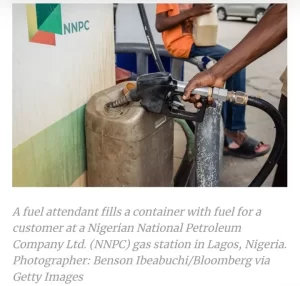Forex Crisis Pushes Petrol Subsidy To N907.5b Monthly

• Actual pump price hits N1,202.7/litre
• Over 90 licensed marketers abandon petrol import as deregulation flops
• Truck drivers may suspend operations as diesel rises to N1,400/litre
• Price control unsettles Dangote, other local refineries
Notwithstanding denials from government, Nigeria is paying about N907.5 billion
subsidy on premium motor spirit (PMS) otherwise called petrol monthly as the
depreciation of the naira has pushed the actual cost of litre of fuel to N1,202.7.
Owing to unresolved price differential, over 90 marketers, who were licensed to import petroleum products into the country have been unable to bring in any products almost nine months after President Bola Tinubu announced the deregulation of the downstream segment of the petroleum industry.
Amid these concerns, the Nigerian Association of Road Transport Owners (NARTO), which distributes petroleum products across the country, told The
Guardian yesterday that they have concluded plans to down tools as they demand double of the existing transportation allowance, which is ordinarily meant to be determined by market forces.
As the price of diesel moves upward to about N1,400 per litre, NARTO said the cost of diesel from Lagos to Abuja has jumped to N1.4 million compared to the
N600,000 it was mid-last year.
With the resumption of the Port-Harcourt Refinery yet to materialise, there are indications that the price control by the government despite deregulation would
frustrate Dangote Refinery and others who are now relying on imported crude oil for processing.
As of the fifth week of the year, when the crude oil price was around $78 per barrel, PMS Eurobob delivered to West Africa was $820.27 per tonne. There are 1000 litres in every tonne, which brings the landing price of petrol per litre in Nigeria to $0.8. Going by the official exchange rate of N1,503.4 to a dollar, the landing price of a litre of PMS should cost N1,202.7. Without other transportation fragments and marketers’ margin, the Federal Government is currently paying about N585.5 subsidy on every litre of petrol.
With the country’s daily consumption dropping from about 65 million litres per day to about 50 million litres, the N585.5 per litre subsidy would be N29.28 billion per day and about N907.5 billion monthly.
Across most West African countries, the price of petrol now hovers between N2,000 and N1,400. Yesterday in Cameroon, a litre of PMS was N2,011; in the Benin Republic, it was N1,633. In Togo, it was N1,680 per litre while it sold for N1,500 per litre in Ghana. It was N2,080 in Mali and N2,042 in Burkina Faso.
Coming at a time when the International Monetary Fund (IMF) is asking Tinubu to remove petrol and electricity subsidies, a confirmation of the position of The Guardian and stakeholders that the government is paying subsidies, marketers, who spoke yesterday, said a crisis is looming in the downstream segment of the petroleum industry. In mid-August, Tinubu stated that despite the deregulation of the downstream
market, the pump price would remain unchanged, as there are no immediate plans to raise fuel prices.
As at the last week of August, PMS was trading for $1,030.11 per metric tonne at the international market compared with the $859.25 it traded around July when
NNPC increased the pump price to an average of N617 per litre. As of the first week of February 2024, while the price came down to $820 per ton, naira had witnessed a free fall that pushed the price of the commodities to about two times of its subsidised cost.
Without any budgetary allocation in the 2023 appropriation, the Nigerian National Petroleum Company Limited (NNPCL) has been the sole importer. Generating over 80 per cent of the foreign exchange, NNPCL imports the products at preferred exchange rate and retails to other marketers.
The expenses, that were not covered by budgetary allocation, are recorded as under-recovery in NNPC’s books.
The President of the Independent Petroleum Marketers Association of Nigeria (IPMAN), Abubakar Shettima, said most of his members who are licensed can import and sell at the current rate.
According to him, the government should create a level playing field and provide foreign exchange at the same level the NNPC is accessing it.
“We have not imported a litre since we got licenses,” Shettima said, adding that “only NNPC is importing”.
Last year, the Chief Executive Officer of the Nigerian Midstream Downstream Petroleum Regulatory Authority, Farouk Ahmed, noted that the federal government was considering options that would sustainably address the concerns of the sector and offered 90 licenses for the marketer to import products.
“NNPC has assured of supply and also the marketers have expressed their concerns about the availability of foreign exchange to enable them to import.
“We as regulators continue to say the market is open for everyone. We have issued licenses to all those who have applied to over 90 marketing companies.
“We have given them access to all the required support that they needed to ensure there is a constant supply of petrol products in the country,” Ahmed said.
President of NARTO, Othman Yusuf, sai transportation of petroleum products across the country is under threat and would be suspended as the environment is
Source:- Guardianng

